The 11 biggest names in cryptocurrency right now
Cryptocurrency has arguably never been hotter than it is right now.
In November, the price of bitcoin topped $10,000 for the first time and is up about 1,000% this year, ethereum hit $500 for the first time and is up more than 5,000% this year, and litecoin hit $100 for the first time and is up more than 2,000% this year, to name just three of the highest market-cap digital coins.
The popular finance narrative in 2016 was all about banks and Wall Street firms experimenting with blockchain technology without cryptocurrency. JPMorgan CEO Jamie Dimon, among other notable bears like Ray Dalio and Prince Alwaleed, has called bitcoin a “fraud” but expressed interest in blockchain.
Now, at the end of 2017, attention has turned back to investing in crypto assets. The “blockchain without bitcoin” crowd hasn’t gone away, but for the moment, it is bitcoin and other cryptocurrencies that everyone is talking about and eyeing closely.
Amidst the frenzied attention on cryptocurrencies, Yahoo Finance on Thursday launched extensive new charts and data for more than 100 different coins, and announced our forthcoming live crypto summit in New York on Feb. 7, where we’ll speak to some of the most prominent influencers, founders, and thought leaders in the crypto industry.
Who are those thought leaders? Here’s our rundown of the 11 biggest names in the space right now, heading into 2018.
Please note: This list is unranked (alphabetical order), and it is focused on cryptocurrency — that is: not on companies using blockchain tech without crypto. (On last year’s list, we did include blockchain-for-enterprise companies.)
Whether you’ve invested in crypto assets or not, whether you’re bullish on the space or think it’s a bubble waiting to burst, all of these people are worth your attention.
1. Brian Armstrong, Coinbase
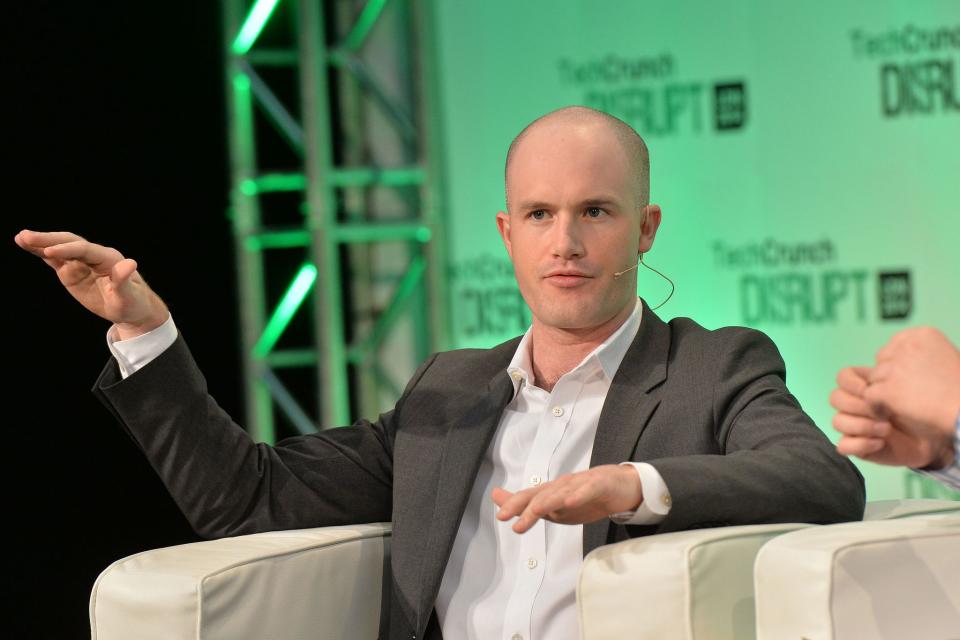
The CEO of the biggest mainstream website for buying bitcoin, Brian Armstrong took some heat this year for supporting SegWit2X, a planned second “fork” to the bitcoin blockchain that got canceled in November. And Coinbase has suffered more frequent outages this year as its server gets overloaded with activity.
But Coinbase is still the No. 1 consumer brand to beat in the race to offer bitcoin newbies an easy, intuitive place to buy. If you are a regular investor looking to dip a toe in, Coinbase is where you go, for now. (Square may eventually bring some big competition; see No. 4.)
Coinbase now has more than 13 million registered users—more customers than Charles Schwab—and has raised $217 million in venture funding. It is bitcoin’s first “unicorn” company, with a $1.6 billion valuation. And as the price of bitcoin and ether keeps soaring, it’s only going to attract more customers.
In addition to Coinbase’s mainstream wallet product, its institutional bitcoin exchange GDAX will be one of four exchanges used by CME Group to price its bitcoin futures (see No. 5), a big sign of faith in GDAX.
2. Vitalik Buterin, Ethereum

When he was only a teenager, Vitalik Buterin co-founded Ethereum with Joseph Lubin, and he continues to be one of the most compelling brainiacs in the crypto space.
Ethereum is a blockchain network, separate from the bitcoin blockchain, specifically designed to store and enact smart contracts, which has led many to tout Ethereum as potentially more exciting than bitcoin.
Developers have flocked to the network to build early-stage apps on top of Ethereum. Coinbase added the ability to buy ether, the token of Ethereum, last year. And Ethereum is to thank (or blame) for the explosion in “initial coin offerings” (ICOs), after its own prominent token sale in 2014, when it raised $18 million worth of bitcoin, allowing it to mine the “genesis block” of the Ethereum network. Now the majority of ICOs are done over Ethereum.
“To me he’s No. 1 on any list,” says Nick Tomaino, general partner at 1confirmation, a crypto investment fund. “He’s been the driving force behind Ethereum, and Ethereum has been the main catalyst for the token boom we’ve seen this year.”
3. Juthica Chou, LedgerX
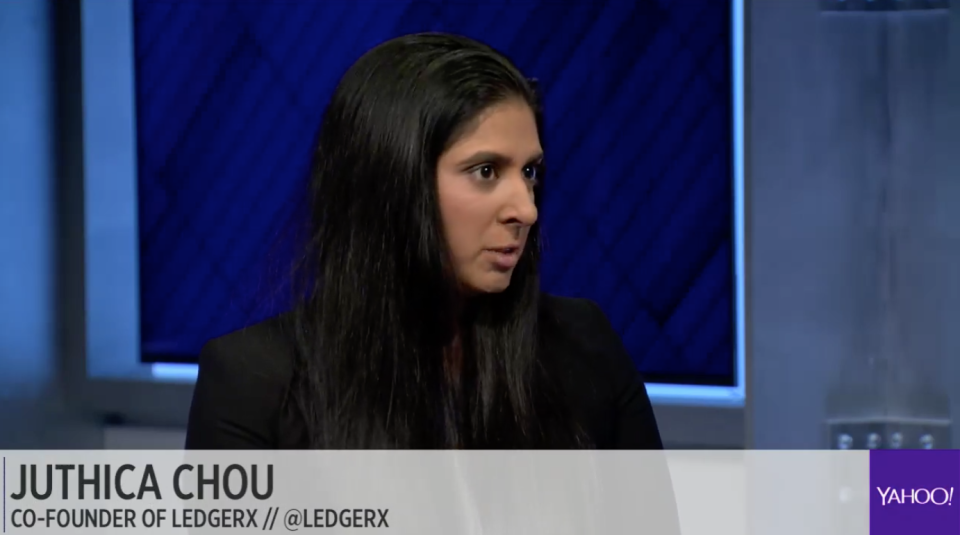
LedgerX is the first federally regulated platform for buying bitcoin options. It lets institutional investors hedge bitcoin, and is the closest current option for shorting the coin, since you could place a bet that the price will drop. Its customers are banks, hedge funds, and mainstream bitcoin companies that deal mainly in bitcoin and want to hedge.
The company received CFTC (Commodity Futures Trading Commission) approval in July after a three-year effort, and in mid-November it matched an option for bitcoin at $10,000 that is good through the end of 2018. The option carried a fee of $2,250. It was the first bitcoin one-year option trade, and attracted massive media attention. What it means: the buyer of the option could wait until the price goes to $20,000, if they can stomach it, and buy in at $10,000 at that point, an obvious bargain; or if the price sinks below $10,000 and never returns in 2018, they could choose not to exercise the option (unlike a futures swap, there’s no obligation to buy) and would lose only their $2,250 fee.
Bloomberg View writes that LedgerX will “transform cryptocurrencies” by bringing mainstream investors in. CoinDesk writes that bitcoin options trading are a “much needed sign of maturity, and could in part help pave the way for even more institutional money to enter the space.”
And that’s the idea. Paul and Juthica Chou, the husband-and-wife co-founders of LedgerX, are both former Goldman Sachs traders. Offering above-board, regulated bitcoin derivatives “gives the guarantee and the safety that the bitcoin ecosystem really needs, especially for institutional involvement,” Juthica Chou told Yahoo Finance in a visit this week. “There was never really a way to bet against bitcoin or to hedge that downside risk.” With LedgerX, she’s thinking big, and just might win over some of those “blockchain, not bitcoin” Wall Street investors.
4. Jack Dorsey, Square
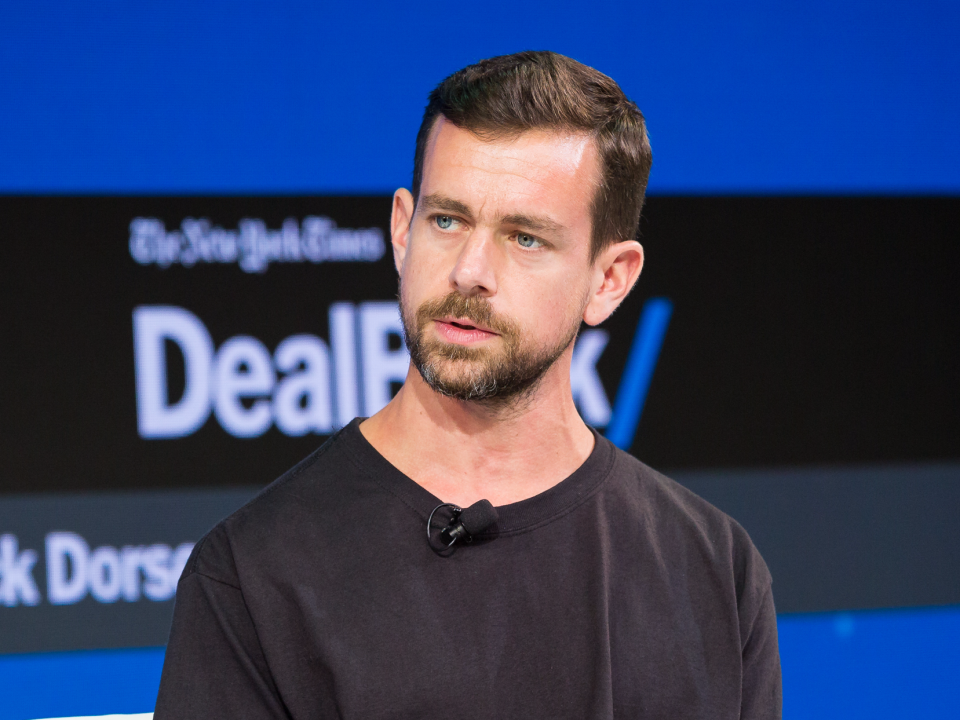
Mobile payments company Square has allowed vendors to accept bitcoin since 2014, but this year the hot company jumped into bitcoin in a bigger way: it added a feature to its Square Cash mobile app that allows customers to buy and hold bitcoin. Square stock popped on the news and is up 183% in 2017.
For now, it’s only a trial run, rolled out to a small number of Square Cash users. But the expectation is that eventually Square could allow its customers to send peer-to-peer payments in bitcoin, and charge a small fee for the transaction, which would be a big deal for both Square’s profitability and for the popularity of bitcoin.
Square CEO Jack Dorsey told Yahoo Finance in October, “There’s nothing that’s more impactful to our business than digital currency and everything that’s happening in cryptocurrency — and the tech behind it. So we are definitely paying attention and are learning as quickly as possible.”
Bitcoin: we tried this with our ecommerce store years back. Didn't see much. Would love to see a digital currency thrive
— jack (@jack) December 30, 2016
Dorsey is a compelling figure in tech, currently the CEO of both Square and Twitter, and he’s using both companies to show his interest in crypto.
That’s a thrill for many veterans of the space. “It’s exciting to see the next wave of mainstream tech companies build crypto products,” says Dan Held, who sold his crypto app ZeroBlock to Blockchain in 2013 and now runs business development for Picks & Shovels, which offers portfolio management to crypto hedge funds. “It looks like Square researched what users wanted in crypto and built the magic product to solve that problem.”
5. Terry Duffy, CME Group

CME Group (Chicago Mercantile Exchange) announced at the end of October that it plans to launch bitcoin futures contracts, and the bitcoin market went into a frenzy. Some attribute the soaring bitcoin price hike of the past month to the CME Group news more than any other single factor. So, while CME had nothing to do with cryptocurrency until now, its plans instantly make it a top player in the space as far as mainstream finance types are concerned.
“You can’t ignore the fact that this is becoming more and more of a story that won’t go away by mainstream companies that want to have access to this product,” CME Group Chairman and CEO Terry Duffy, who is overseeing CME’s bitcoin futures, said on CNBC. “We’re getting a huge pent-up demand from clients, not just on the speculative side, but on the commercial as well. People are looking for more efficient ways to do commerce. And whether this is the right way or not, I’m not quite sure, but we are going to list the product under our rules, and if it doesn’t work, we have the ability to eliminate it.”
CME will price its bitcoin futures according to an index price calculated from four bitcoin exchanges: Bitstamp, GDAX (from Coinbase, see No. 1), itBit, and Kraken.
It won’t be without competition: CBOE (Chicago Board Options Exchange) also says it will offer bitcoin futures next year, and will price its futures using Gemini, the bitcoin exchange launched by Cameron and Tyler Winklevoss (who made this list last year.) And then there’s LedgerX, which is also offering derivatives, though not futures. Juthica Chou of LedgerX (see No. 3), when asked about CME Group’s plans, says: “It’s my personal view that the bitcoin markets are not quite developed enough” for cash-settled futures.
Nonetheless, when CME launches bitcoin futures, expect big buzz.
6. Charlie Lee, Litecoin
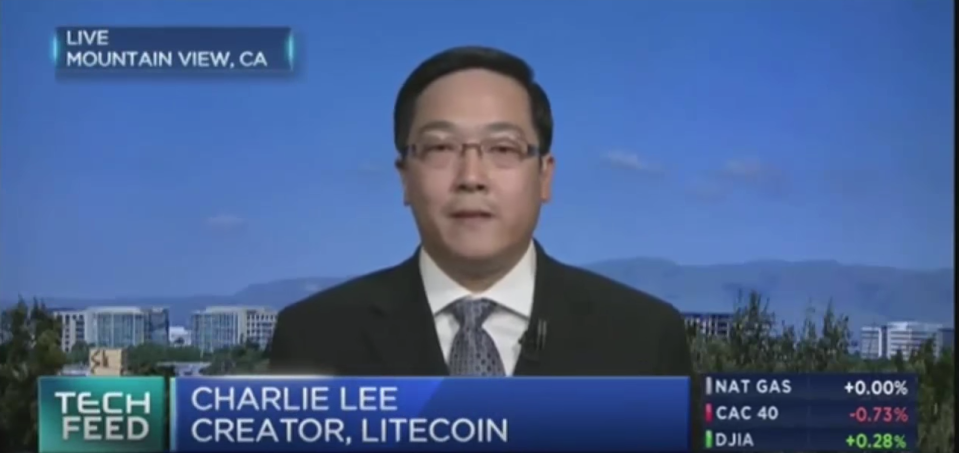
Litecoin is an alternative cryptocurrency to bitcoin, created in 2011 by Charlie Lee. It is the third-oldest still-extant cryptocurrency (and No. 2, namecoin, is not relevant) and the No. 5 cryptocurrency by market cap if you don’t count bitcoin spinoffs. Litecoin is also one of the only three coins you can currently buy through Coinbase (see No. 1), along with bitcoin and either.
While many dismiss litecoin as what it sounds like — a mere bitcoin “lite” — there are a few key technical differences that make it more appealing for some.
Litecoin’s network (a fork from the bitcoin core source code) is much faster than the bitcoin blockchain (mining a “block” of transactions takes an average 2.5 minutes compared to bitcoin’s 10 minutes), and transaction fees are almost zero. Litecoin has a supply cap of 84 million coins to bitcoin’s 21 million. And litecoin uses a different proof-of-work algorithm (Scrypt), which means that the devices for mining litecoin do not use ASIC technology, so they have not become obsolete as quickly as the mining equipment for bitcoin, which has become so cost prohibitive so rapidly that it priced out many individuals and concentrated much of the global mining power in China.
In May, the first litecoin payment using the Lightning protocol (See No. 11) was sent from Zurich to San Francisco in under a second. The Motley Fool writes that bitcoin’s biggest competition isn’t ethereum, but litecoin.
Unlike bitcoin, which has a mysterious, anonymous creator in Satoshi Nakamoto, litecoin’s creator is public and well-liked. Knowing who stands behind the coin is, for many people, a comfort. Lee, who left Google to create litecoin, was later the director of engineering at Coinbase and has been lovingly called “Satoshi Lite.” On Twitter, he is insightful and funny, and regarded as a top thinker on crypto.
As bitcoin has risen, so too has litecoin this year: it’s up more than 2,000% in 2017 and has a market cap of $5 billion. Not bad for “bitcoin lite.”
7. Naval Ravikant, MetaStable, CoinList

The founder of AngelList has turned his attention to cryptocurrency, and the community is thrilled.
Ravikant, whom Fast Company called a “startup kingmaker,” has invested in some of the biggest mainstream tech unicorns, including Twitter, Uber, Change.org, Codeacademy, Disqus, and Foursquare. More recently, he has also invested in 21 Inc. (see No. 10), Blockstack, and Kraken.
This year, Ravikant went beyond just investing in cryptocurrency companies: he’s now helping build and run two of his own. First, there’s MetaStable Capital, a stealth-mode hedge fund devoted to cryptocurrency investing and backed by Ravikant, Andreessen Horowitz, Sequoia Capital, Union Square Ventures, and Founders Fund, according to Fortune. In other words: it’s a secretive crypto hedge fund, all the very biggest Silicon Valley venture capitalists are involved, and Ravikant appears to be the face of it. Second, he co-founded CoinList, a financial services provider for ICOs that listed the recent token sales of Filecoin and Blockstack and wants to make investing in ICOs safer.
On a recent “Unchained” podcast episode, Ravikant said something that should delight any bitcoin believer who likes it when big established tech names get into the space: “I would say my mindshare is heavily crypto.”
8. Elizabeth Rossiello, BitPesa

BitPesa launched in 2013 in Africa as an app for faster, cheaper business payments in bitcoin. Its clients are companies that can use BitPesa to pay employees or pay other businesses, and individuals who can use BitPesa to send funds to other mobile money wallets.
To be sure, there are other companies like BitPesa in other countries. But those other companies didn’t get a $2 million investment this year from Alan Patricof, founder and managing partner of Greycroft Ventures and one of the world’s most influential venture capitalists. BitPesa’s $3 million funding round this summer, including the Greycroft investment, brings its total funding to $10 million.
So why did Patricof choose BitPesa for his first crypto investment? Because of how impressed he is by BitPesa founder and CEO Elizabeth Rossiello, Patricof told Fortune. Rossiello earned a master’s in international business and finance at Columbia SIPA in 2006, then held finance jobs including as an analyst at Credit Suisse, before she ended up in Africa, where she came up with BitPesa after noting that everyone there relies on their phones for their banking. BitPesa has been lauded as a way to use bitcoin to spur financial inclusion.
BitPesa says it has seen average month-over-month growth of more than 20% in transaction volume for the past two years straight. The product now facilitates $12 million in transactions per month, compared to $1 million per month just one year earlier.
The soaring adoption rate BitPesa is seeing, Rossiello says, “is uncorrelated to the bitcoin price, rather it’s steady adoption by companies working with startups for innovative solutions that solve real problems in emerging markets.” Rossiello and BitPesa are starting out in Africa, but proving out a model that has major global implications.
9. Barry Silbert, Digital Currency Group

Just two years after Nasdaq bought his company SecondMarket, which allowed for the trading of stock in private companies (like Facebook before it went public), Barry Silbert has become the single biggest name in cryptocurrency startup investing, bar none.
His investment firm, Digital Currency Group, is the largest backer of digital currency companies, and its portfolio of more than 100 investments includes all the biggest names: BitGo, BitPay, BitPesa (see No. 8), Blockchain, Blockstack, Blockstream, Chain, Coinbase (see No. 1), itBit, Kraken, Ripple, Shapeshift, and Xapo, to name just a handful. It is an alphabet of hot crypto companies.
Then there’s Genesis Trading, the rebranded former bitcoin desk of SecondMarket, and Bitcoin Investment Trust, another DCG venture, which is like a tracking stock for bitcoin, traded on OTC markets as a way for mainstream investors to get exposure to bitcoin without actually buying bitcoin.
On top of all that, DCG made its first full acquisition last year: it bought the leading bitcoin news site CoinDesk, which runs the industry’s marquee annual live event, Consensus. So DCG has bitcoin news and live events cornered as well.
10. Balaji Srinivasan, Earn.com

Balaji Srinivasan had a noisy year.
In January, Srinivasan, co-founder of DNA screening company Counsyl and an Andreessen Horowitz board partner, was rumored to be President Donald Trump’s potential pick to run the FDA, and he met with Trump.
That same month, his company 21, which has more venture funding ($121 million) than any other bitcoin company except Coinbase (see No. 1), launched its next phase of product: a network for users to earn bitcoin by completing tasks from their mobile phones. It was the next step toward achieving what Srinivasan described to Yahoo Finance as a “machine economy.”
Now, in October, 21 Inc rebranded to Earn.com as a way to better convey its current concept to a mainstream audience. It’s a clever move that broadens the potential for Earn.com to attract people who may not understand bitcoin yet. To use Earn.com, they don’t need to: They can simply set up a verified, public profile at which they can be messaged by a sender, and earn bitcoin for replying. They don’t need a bitcoin wallet or even a bank account to do it. (Meanwhile, the company has discontinued support for its Raspberry Pi-powered personal bitcoin computer.) Srinivasan calls Earn.com “the first commercial social network.”
What’s next for Earn.com? A token launch, of course — but without an ICO.
11. Elizabeth Stark, Lightning Labs
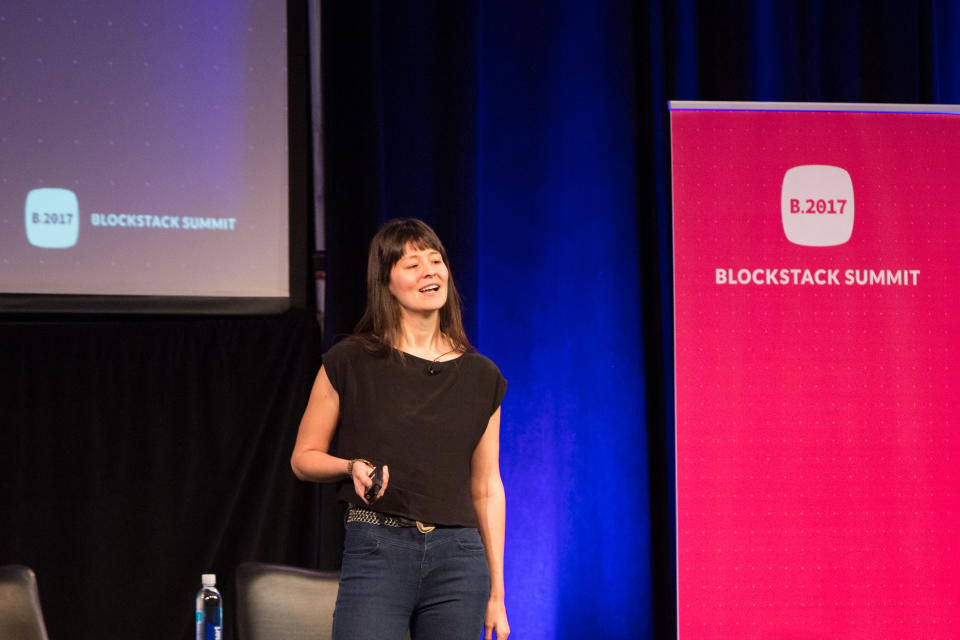
One of the biggest problems with bitcoin is the increasing demand for the limited block space on the bitcoin blockchain. The issue has forced a political debate amongst the bitcoin developer community over whether to increase the maximum size of the transaction bundles, or “blocks,” that get mined.
Lightning may provide the solution.
Lightning is a second payment layer on top of the bitcoin protocol that can facilitate faster peer-to-peer payments, because the payments happen off the blockchain. Think of it as even more “decentralized” than bitcoin, since transactions are settled over a network of smaller channels, rather than one main bitcoin blockchain.
Payments made over Lightning are faster, cheaper, and more private than payments made over a blockchain. And Lightning works for other cryptocurrencies, like litecoin. In fact, its first transaction, in May of this year, happened in litecoin.
A major initial appeal of bitcoin was the speed of remittances — minutes, compared to transfer waits of days with Western Union. Lightning payments happen in seconds.
Joseph Poon and Thaddeus Dryja published the Lightning Network white paper in 2015, describing the project as “scalable off-chain instant payments.”
Now Elizabeth Stark, CEO of Lightning Labs, is driving the development of the Lightning protocol. And people are extremely excited about Lightning Labs, and about Stark’s vision. She calls the next phase of crypto development “Layer 2,” and at the Blockstack Summit this year described it this way: “Layer 2 can be the application layer for blockchains and for the new decentralized internet. It can be the HTTP for blockchains.” HTTP (Hypertext Transfer Protocol) is the protocol that powers the internet. If Lighting can help build the HTTP equivalent for the new, crypto-powered internet, that’s exciting stuff.
Okay, who did we miss? Give us your list of crypto stars in the comments below.
—
Daniel Roberts covers bitcoin and blockchain at Yahoo Finance. Follow him on Twitter at @readDanwrite.
Read more:
Square’s bitcoin trial is a big deal
Japan is poised to become the leading bitcoin market
Why China’s central bank fears bitcoin
Why Ethereum is the hottest new thing in digital currency
